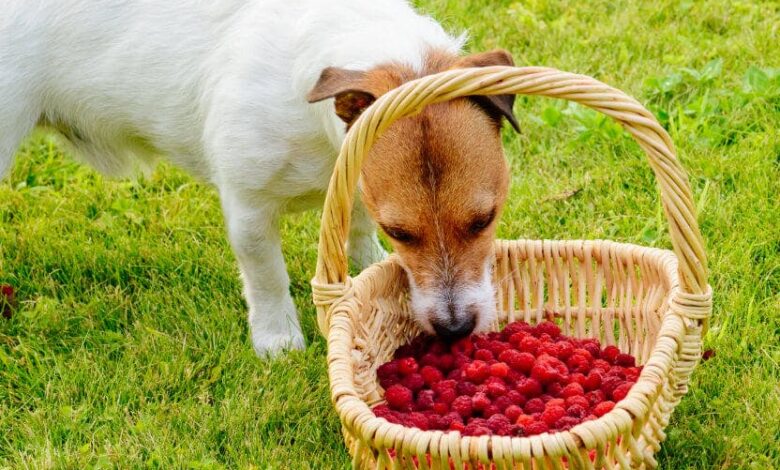
Raspberries are a delicious and healthy snack for humans, but if you’re a dog owner, you may be wondering: can dogs eat raspberries too? The good news is that dogs can safely enjoy raspberries in moderation, but there are a few important things to consider before offering them to your furry friend. This guide will provide you with everything you need to know about feeding raspberries to dogs, including the health benefits, potential risks, and the best ways to serve this tasty fruit. Let’s discuss that- Can Dogs Eat Raspberries?
Can Dogs Eat Raspberries?
Yes, dogs can eat raspberries! These berries are packed with nutrients and antioxidants that can benefit your dog’s overall health. However, it’s essential to feed them in moderation because raspberries contain natural sugars and small amounts of xylitol, a compound that can be harmful to dogs in large quantities. By keeping portions small and occasional, raspberries can be a safe and nutritious treat for your pup.
Health Benefits of Raspberries for Dogs
Raspberries are not only tasty but also packed with nutrients that can support your dog’s health. Here are some of the key benefits:
1. High in Antioxidants
Raspberries are rich in antioxidants, such as vitamin C, vitamin E, and beta carotene. Antioxidants help combat oxidative stress by neutralizing free radicals, which can damage cells. This supports overall health and may reduce the risk of chronic diseases, including cancer and heart disease.
2. Anti-Inflammatory Properties
Raspberries contain polyphenols, natural compounds known for their anti-inflammatory properties. These can be particularly beneficial for older dogs with arthritis or joint pain, as well as active dogs recovering from physical activity.
3. Supports Digestive Health
Raspberries are an excellent source of dietary fiber, which aids digestion and promotes gut health. Fiber helps regulate bowel movements and supports a balanced microbiome in your dog’s digestive system.
4. Low-Calorie Treat
For dogs that need to watch their weight, raspberries are a guilt-free snack. They are naturally low in calories and sugar compared to many other fruits, making them a suitable option for dogs prone to weight gain.
5. Vitamins and Minerals
Raspberries are packed with essential vitamins and minerals, including:
- Vitamin C: Boosts the immune system and reduces inflammation.
- Vitamin K: Important for bone health and proper blood clotting.
- Manganese: Supports metabolic processes and bone development.
- B Vitamins: Promote energy production and a healthy coat.
How Many Raspberries Can Dogs Eat?
When feeding raspberries to dogs, portion control is critical. Here’s a general guideline based on your dog’s size:
| Dog Size | Example Breeds | Number of Raspberries |
| Toy | Chihuahua, Pomeranian | 1 or 2 |
| Small | Dachshund, Corgi | 2 or 3 |
| Medium | Beagle, Border Collie | 5 or 6 |
| Large | Labrador, German Shepherd | Small handful |
Always start with a small amount when introducing raspberries to your dog and observe how they react. If your dog enjoys them without any digestive upset, you can occasionally incorporate them as a treat.
Potential Risks of Feeding Raspberries to Dogs
While raspberries are generally safe, there are some risks to keep in mind:
1. Xylitol Content
Raspberries naturally contain trace amounts of xylitol, a sweetener that can be toxic to dogs in large quantities. While the amount in raspberries is low, overfeeding can pose a risk, especially for smaller dogs. Always stick to the recommended portion sizes.
2. Digestive Upset
Feeding your dog too many raspberries can lead to diarrhea, gas, or bloating due to their high fiber content. Dogs with sensitive stomachs may need to avoid raspberries altogether.
3. Allergic Reactions
Though rare, some dogs may have allergies to raspberries. Signs of an allergic reaction include itching, swelling, vomiting, or diarrhea. If you notice any of these symptoms, discontinue feeding raspberries and contact your veterinarian.
4. High Sugar Content
While raspberries are relatively low in sugar compared to other fruits, they still contain natural sugars. Overfeeding can contribute to weight gain or exacerbate conditions like diabetes in dogs.
How to Safely Feed Raspberries to Your Dog
To ensure raspberries are a safe and healthy treat for your dog, follow these tips:
1. Wash Thoroughly
Rinse raspberries under cool water to remove pesticides, dirt, or bacteria that could be harmful to your dog.
2. Serve Plain
Avoid adding sugar, syrup, or other toppings to raspberries. Plain raspberries are the healthiest option for dogs.
3. Cut for Small Dogs
For smaller breeds of puppies, cut raspberries into halves or quarters to make them easier to chew and digest.
4. Use Moderation
Offer raspberries as an occasional treat, not as a regular part of your dog’s diet. They should complement a balanced diet, not replace it.
5. Monitor Your Dog
Watch for any signs of digestive upset or allergic reactions, especially when feeding raspberries for the first time.
Creative Ways to Serve Raspberries to Your Dog
Here are some fun and creative ways to include raspberries in your dog’s diet:
1. Frozen Treats
Freeze raspberries for a refreshing snack on hot days. The icy texture can also soothe teething puppies.
2. Raspberry and Yogurt Bites
Blend raspberries with plain, unsweetened yogurt and freeze the mixture in ice cube trays for a nutritious, cooling treat.
3. Fruit Salad
Combine raspberries with other dog-safe fruits like blueberries, apples, or bananas for a colorful and healthy fruit salad.
4. Meal Topper
Sprinkle a few raspberries over your dog’s regular food to add a burst of flavor and extra nutrients.
Can Puppies Eat Raspberries?
Yes, puppies can eat raspberries, but only in very small amounts. Start with one raspberry to see how your puppy reacts. Puppies have sensitive digestive systems, so it’s important to introduce new foods gradually. Ensure that raspberries are a rare treat and that your puppy’s primary nutrition comes from high-quality, complete puppy food.
Frequently Asked Questions
1. Can all dogs eat raspberries?
Most dogs can eat raspberries, but it’s important to consider individual factors like allergies, digestive sensitivity, and medical conditions such as diabetes.
2. Are frozen raspberries safe for dogs?
Yes, frozen raspberries are safe and can be a refreshing treat, especially in the summer. Just make sure they’re plain and free of additives.
3. Can raspberries replace regular treats?
Raspberries should not replace regular dog treats or meals. They’re best used as an occasional supplement to a balanced diet.
4. What should I do if my dog eats too many raspberries?
If your dog consumes a large number of raspberries, watch for signs of digestive upset, such as diarrhea or vomiting. Contact your veterinarian if you notice severe symptoms or suspect xylitol toxicity.
Final Thoughts: Can Dogs Eat Raspberries?
So, can dogs eat raspberries? The answer is yes—when served in moderation, raspberries can be a healthy and tasty treat for your dog. They offer numerous health benefits, including antioxidants, fiber, and essential vitamins, while being low in calories. However, it’s crucial to follow portion guidelines and monitor your dog for any adverse reactions.
If you have any concerns about introducing raspberries or other new foods into your dog’s diet, consult your veterinarian for personalized advice. With proper care and moderation, raspberries can be a delightful addition to your dog’s treat list!



